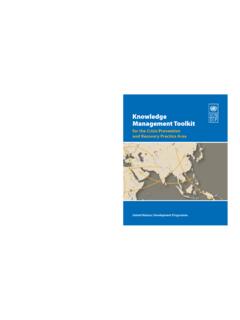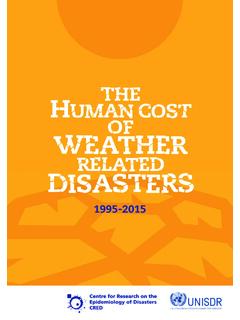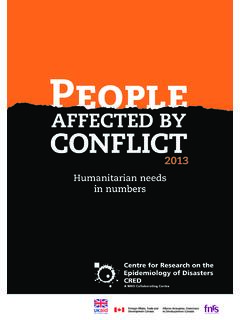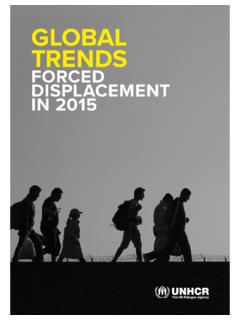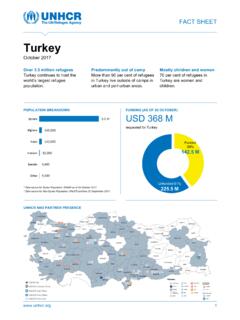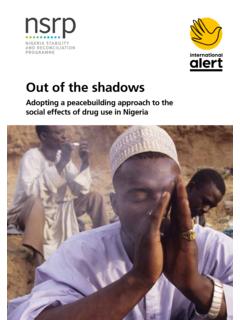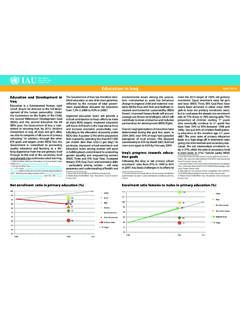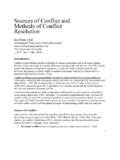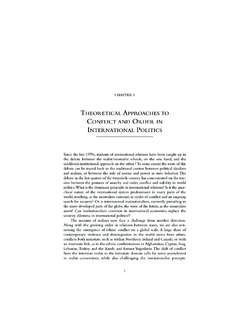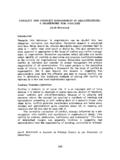Transcription of Peace-Building, Crisis Prevention and Conflict …
1 Division 42 State and Economic Reform, Civil SocietyPeace-Building, Crisis Preventionand Conflict ManagementTechnical Cooperation in the Context of Crises, conflicts and DisastersDeutsche Gesellschaft f r Technische Zusammenarbeit (GTZ) GmbHPeace-Building, Crisis Preventionand Conflict ManagementTechnical Cooperation in the Context of Crises, conflicts and DisastersEschborn 2002 Division 42 State and Economic Reform, Civil SocietyAuthor: Dr. Norbert RopersDr. Norbert Ropersis Director of the Berghof Research Center for Constructive Conflict Management in Berlin.
2 Hismain areas of work are theory and practice of ethnopolitical Conflict management, integration of Conflict manage-ment into development cooperation and humanitarian aid, as well as contributions by civil society actors topeace-building with special regional focus on the southern Caucasus, OSCE and Sri Lanka. Contacts in GTZ:Bernd HoffmannDirector of Division 42: State and Economic Reform, Civil SocietyTelephone: ++49-(0) 61 96-79 16 51E-Mail: Uwe KievelitzProgramme Manager Crisis Prevention and Conflict TransformationTelephone: ++49-(0) 61 96-79 13 26E-Mail: by:Deutsche Gesellschaft f r Technische Zusammenarbeit (GTZ) GmbHPostfach 5180 D-65726 EschbornFederal Republic of GermanyInternet: :Bernd Hoffmann, GTZA uthors:Dr.
3 Norbert RopersBerghof Research Centre forConstructive Conflict Management, BerlinChapter on Structural Stability Dr. Stephan KlingebielGerman Development Institute, BonnEditor:Melanie Seegr f, GTZR esearch consultants: Prof. Dr. Lothar Brock Johann Wolfgang Goethe University, Frankfurt-on-MainPD Dr. Brigitte FahrenhorstSociety for International Development, BerlinTranslation team:John D. Cochrane, Suzanne GeorgeForewordAfter 11 September, a set of conceptual guidelines for Technical Co-operation could barely be any more relevant than the present the wake of the debate surrounding the implications andconsequences of the terrorist attacks, development policy has assumed anew stature, and gained a fresh dimension.
4 More than ever before, we arebeing called upon in our work to help improve the living conditions andprospects of people in our partner countries, and increase our efforts toprevent crises and defuse conflicts . The lack of prospects for young peopleis itself a fertile breeding ground for extremist views, and the will to useviolence which they German Government sees development policy as global peace is based on a broad understanding of security which goes beyondtraditional security policy. Development policy is mandated to fight the rootcauses of poverty, injustice and the destruction of the vital natural resourcebase on which people depend, as well as to make direct inputs to thepeaceful resolution of crises and conflicts rooted in poor development andsocial transition.
5 Germany is thus one of many bi- and multilateral donorswhich increasingly see development cooperation as a contribution to crisisprevention and peaceful Conflict management, and which are orienting theirwork accordingly. The present working paper seeks to conceptually under-pin this new area of work in the specific context of Technical the same time, it outlines GTZ s existing services in this also outlines the prospects for future tasks in this new work broad experience in implementing Crisis - and Conflict -relatedmeasures, as reflected in the activity areas and services outlined in thepresent paper.
6 On the whole, however, individual approaches , instrumentsand services will need to be further developed on a continuous basis. In thiscontext it will be necessary to continuously review and redefine theconcrete potentials and limits of Crisis Prevention and Conflict present working paper was written for a broad audience. First andforemost it is designed for all Technical Cooperation personnel. It is alsointended for ministries, international institutions and non-governmentalagencies. Finally, we also hope it will meet with keen interest on the part ofall our many partners, from the consulting sector to the research institutionscooperating with thanks are due to the author of the publication, Dr.
7 Norbert Ropers ofthe Berghof Institute in Berlin, who in his capacity as our staff member in SriLanka is making a direct contribution to peace-building in that thanks are also due to the research consultants, Dr. Brigitte Fahren-horst and Professor Dr. Lothar Brock, and to all those whose suggestions andcomments were so valuable to Bernd Eisenbl tterBernd HoffmannDirector GeneralDirector of DivisionList of ContentsList of Acronyms and Abbreviations71. Peace-building, Crisis Prevention and Conflict Management a Cross-cutting Theme for GTZ92.
8 The Current Development-policy Peace Policy and Crisis Prevention as Strategic Elementsof German Development Peace-building, Crisis Prevention and Conflict Managementas Activity Areas of Technical The Relationship between Crisis Prevention andConflict Management, and Development-orientedEmergency Aid (DEA) Crisis Prevention and Conflict Management Challenges for Reform of the State, the Economyand Society253. The Initial Context, and approaches to Crisis Preventionand Conflict Crises and conflicts within the Social Development Markets and Cultures of Forecasting Crises and Mapping The Phases of a Conflict and Time Frame of The Levels of Social Leadership and their The Partisan Allegiances of Target Groupsand Partner Promoting Structural Stability as a Basis forSustainable Development434.
9 Strategies for Crisis Prevention and Conflict Management in Technical General Principles of Action for Crisis Preventionand Conflict Promoting Structural Stability to Underpin CrisisPrevention and Sustainable Strengthening the Crisis Prevention and Conflict Management Capacities of Civil Society Groups, and Local and Regional Challenges and Dilemmas for the Design of CrisisPrevention and Conflict Management Processes575. GTZ s Implementation Strengthening Civil Society Groups of StrategicSignificance for Building a Peace Promoting Local Institutions and Mechanismsfor Peaceful Conflict Management64 Promoting a Media Contribution to Crisis Developing Education and Youth Promotion Measuresto Provide Education for Peace and Conflict Post-War Trauma Healing Post- Conflict Reconciliation and Coming to Terms with the Training Measures for Crisis Prevention and Conflict Security-Sector Reform756.
10 Bibliography77 List of Acronyms and AbbreviationsBMZF ederal German Ministry for Economic Cooperationand DevelopmentCFSPC ommon Foreign and Security Policy of the EUCPNC onflict Prevention Network CPRC onflict Prevention and Post- Conflict Reconstruction NetworkCPSC ivil Peace ServiceDACD evelopment Assistance Committee of the OECDDEAD evelopment-oriented Emergency AidDFIDD epartment for International Development (UK)EUEuropean UnionGTZD eutsche Gesellschaft f r Technische Zusammenarbeit (GTZ) GmbHNGONon-Governmental OrganisationOECDO rganisation for Economic Co-operation and DevelopmentOSCEO rganization for Security and Co-operation in EuropeTCTechnical CooperationUNUnited NationsUNESCO United Nations Educational, Scientific and Cultural Organization1.
